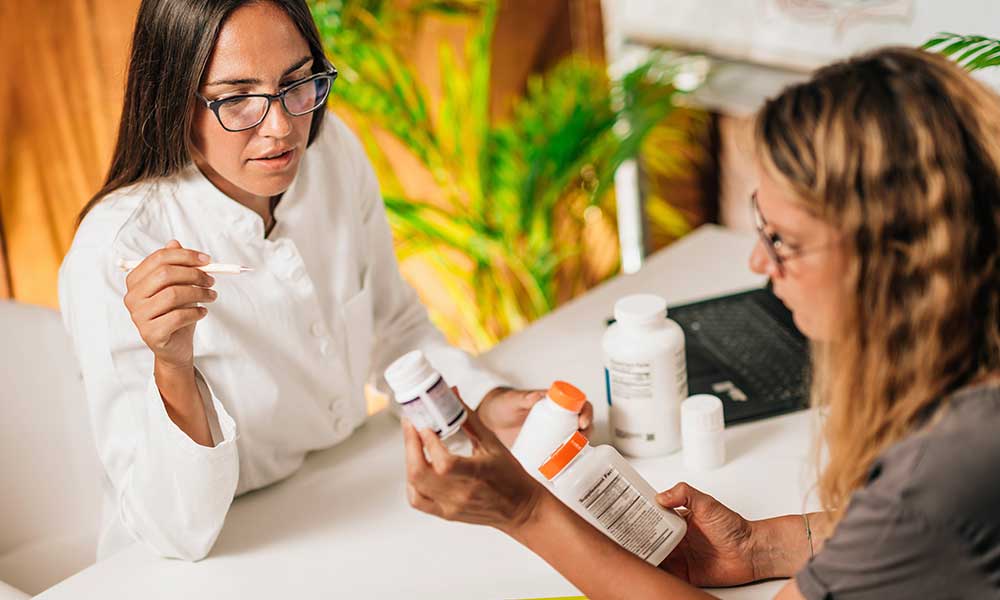Introduction
If you’re someone who is looking to lose weight, then you’ve probably heard about hormone replacement therapy. That’s because it’s becoming increasingly popular for people looking to reverse the aging process and get their body into shape. But what does hormone replacement therapy have to do with weight loss?
Hormone replacement therapy involves replacing hormones that are naturally present in the body such as testosterone, estrogen, and other hormones related to metabolism, growth, stress regulation and more. When these hormones become imbalanced or depleted due to aging or poor lifestyle habits, it can lead to weight gain or difficulty losing weight—not to mention a host of other health issues.
In this article, we’ll be looking at how hormone replacement therapy can help with weight loss. We’ll discuss how it works, what are the potential benefits and side effects of hormone replacement therapy, and when and who should consider it.

Overview of Hormone Replacement Therapy
You’ve probably heard of hormone replacement therapy, but what does it actually do and how does it work? It’s a type of treatment that introduces specific hormones into the body to make up for those that have started to decline. In particular, estrogen is often used in hormone replacement therapy in order to preserve muscle strength and reduce bone loss. This can be particularly helpful for those going through menopause, as estrogen-based therapy can help relieve symptoms such as hot flashes and night sweats.
Hormone replacement therapy works by introducing a number of hormones – including estrogen – into the body, either through tablets or patches applied directly on the skin. The goal is to supplement any deficiencies your body might have and restore your hormones to more youthful levels. And, this has been shown to not only help with weight loss but also provide other anti-aging benefits, including improved cognitive function and better skin health.
How Hormone Replacement Therapy Can Help Reverse Aging and Facilitate Weight Loss
As you age, your skin tends to lose its elasticity and become thinner. Hormone replacement therapy (HRT) has been shown to help reverse this process. By improving epidermal hydration, skin elasticity, and skin thickness, HRT can help restore a more youthful appearance to your skin.
But the effects of HRT don’t just stop there. Oftentimes, the decline in hormones that can come with age can lead to an overall decrease in energy levels, making daily tasks much more difficult than before. HRT can help promote increased energy and metabolism in the body—both of which may potentially aid in weight loss.
Additionally, research shows that hormone replacement therapy (ERT) or hormone replacement therapy/HRT can reduce plasma LDL levels as well as attenuate fat gain and decreased lean mass. This suggests that these therapies may also be effective for helping decrease overall body fat and aiding in weight loss while preserving muscle mass.
Risks and Side Effects of Hormone Replacement Therapy
You may be wondering if there are risks associated with hormone replacement therapy. While it’s true that hormones can be dangerous in large amounts and can cause side effects, the risk of these when taking hormone therapy is minimal. Estrogen therapy, for example, helps to decrease the risk of certain serious health conditions such as coronary heart disease, diabetes, and cancer. Additionally, the risk of blood clots, heart attack and stroke are also minimal when taking hormone replacement therapies.
So while it’s important to weigh the risks before starting any kind of hormone therapy—especially if you’re older—the benefits should certainly be considered too. Research suggests that with proper medication and dosages, hormone replacement therapies can help prevent and reverse some signs of aging like muscle loss and skin thinning for both men and women.
With women, hormone replacement therapy is also known to reduce the risk of osteoporosis and can prevent the onset of menopausal symptoms such as hot flashes, night sweats, and vaginal dryness. Furthermore, studies have shown that it may also reduce the risk of some forms of cancer, such as ovarian cancer.
However, there are some potential risks you should keep in mind. For instance, taking estrogen therapy may raise the risk of endometrial cancer, so your doctor may recommend taking progesterone or another type of therapy to counteract this risk. In addition, taking estrogen replacement therapies can increase the risk of stroke and heart attack, so it’s important to get regular checkups and discuss with your doctor your full health history to ensure you are a good candidate for hormone therapy.
Lastly, although hormone replacement therapy can help with weight loss, it is important to keep in mind that it should not be used as a left-alone weight loss solution. If hormone therapy is the right option for you, it should be used in conjunction with a healthy diet and regular exercise to reap maximum benefits. Your doctor can help advise you on the best course of action for weight loss and other medical issues that may be related to hormone therapy.

Natural Alternatives to Hormone Replacement Therapy
You might be wondering, what are some natural alternatives to hormone replacement therapy? One possibility is bioidentical hormone replacement therapy. This is a form of hormone therapy that uses hormones made from plant sources like soy and yams. These hormones are similar to the hormones the body produces, so they can help restore balance.
Bioidentical hormones can provide the same relief as estrogens alone or with progesterone, and they may help relieve climacteric symptoms, such as hot flashes and night sweats. Unlike traditional hormone replacement therapy, bioidentical hormone therapy involves using hormones that are tailored to each individual’s unique health needs and goals. This kind of treatment is considered a natural solution to imbalanced hormone levels.
Effects of Estrogen-Based Hormone Therapy
Additionally, an estrogen-based hormone therapy can help preserve muscle strength and reduce weight gain associated with aging. It can also help protect against osteoporosis by promoting bone formation and slowing down bone resorption – this helps the bones stay strong for longer periods of time.
So whether you’re looking for a natural way to counter aging effects or just want to try something different than traditional options, consider talking to your healthcare provider about bioidentical hormone replacement therapy today.
Understanding the Benefits, Risks, and Alternatives to HRT
As we’ve seen, HT can have a positive impact on your health and wellbeing, as it can help you to avoid obesity and obesity-related illnesses, while at the same time improving your skin elasticity and epidermal hydration. That said, you should understand that HT is not without its risks.
Side Effects
One of the most important things to consider is the side effects of using hormone replacement therapy. Estrogen therapy, for instance, has been linked to an increased risk for certain health conditions such as breast cancer, stroke, blood clots and gallbladder disease. Other potential side effects may include headache and vaginal bleeding.
Alternatives To HRT
For those looking to reduce their risk of experiencing such negative side effects, there are other options available. Things like diet and exercise have been proven effective in reversing aging processes in some individuals. Additionally, herbal supplements like black cohosh have also been shown to reduce menopausal symptoms in some individuals as well.

Preparing for a Consultation: What to Ask When Considering HRT
If you’re considering pursuing hormone replacement therapy (HRT), the process can be a bit overwhelming. You may have questions about what to expect, the efficacy of the therapy, and any potential risks that come with it.
The best way to ensure that all your questions are answered is to be prepared for your consultation. It’s important to feel informed and comfortable discussing your health, so here are some questions that you can ask when considering HRT:
- What options do I have for hormone replacement therapy?
- What side effects should I be aware of?
- Are there any medical conditions or medications that might contraindicate hormone replacement therapy?
- How long will the therapy take before I see results?
- Will taking HRT interfere with other medications or treatments?
- What are the risks associated with hormone replacement therapy?
- Are there any lifestyle changes I should make while undergoing HRT?
Answering these questions may help you decide whether hormone replacement therapy is right for you. But remember: It’s always important to speak with your doctor and carefully weigh the pros and cons before starting a course of treatment.
Conclusion
In conclusion, hormone replacement therapy has a demonstrable effect on weight management and overall health, and is a powerful tool for those looking to reverse the aging process. It can be used to both reduce the signs of aging and promote weight loss.
That said, it’s important to consider the potential risks as well as the potential benefits. If you’re considering hormone replacement therapy, start by talking to your doctor to make sure it’s right for you. Be sure to ask questions and discuss the potential risks and benefits. This is the best way to ensure that you get the most out of the therapy and that it works for you.































